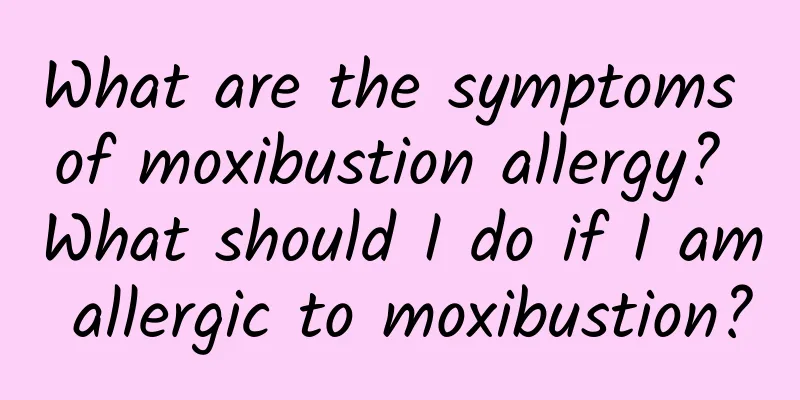Is the widely circulated saying "left eye twitching means good fortune, right eye twitching means bad luck" true or false? Today we must clarify...

|
Expert of this article: Li Zongou, Master of Ophthalmology, First Affiliated Hospital of Dalian Medical University This article was reviewed by Xu Qibin, associate chief physician, deputy director of the Department of Ophthalmology, Zhejiang Provincial Hospital of Integrated Traditional Chinese and Western Medicine In daily life Everyone must have experienced eyelid twitching. Why do eyelids twitch? Everyone has different opinions Some people say it’s caused by not sleeping well. Some people also say it is a matter of eye habits. The most widely circulated saying is "Left eye twitching brings fortune, right eye twitching brings disaster" So Is there any scientific basis for this statement? What should you do when your eyelids twitch? Let’s watch… Why do eyelids twitch? Eyelid twitching is called eyelid tremor in ophthalmology. There are two main muscles on our eyelids, one is the orbicularis oculi muscle and the other is the levator palpebrae superioris muscle. The two muscles help the eyes to close and open by contracting and relaxing. However, due to factors such as fatigue, the nerves may be over-stimulated, causing the eyelid muscles to tremble. From the outside, it looks as if the eyelid skin is "jumping", which is what we often call eyelid twitching. The reasons for eyelid twitching may be not getting enough rest after excessive fatigue, excessive use of eyes, irregular work and rest, mental stress, anxiety and depression, etc. In addition, smoking, drinking, and drinking caffeinated beverages may also cause eyelid twitching. To sum up, the saying “left eye twitching means wealth, right eye twitching means disaster” has no scientific basis, and we must look at it scientifically. How to deal with eyelid twitching? Eyelid twitching can be divided into physiological and pathological types, of which the vast majority are physiological. Physiological eyelid twitching is usually intermittent, short in duration, and weak, and can usually be relieved without treatment. Developing good living habits, paying attention to rest, avoiding excessive use of the eyes, quitting smoking and limiting alcohol consumption can reduce the occurrence of eyelid twitching. When your eyelids twitch, you can gently pinch your eyelids with your index finger and thumb and shake them a dozen times, and the twitching may stop. These eyelid twitches need attention If eyelid twitching persists and does not subside for a long time, you should consider whether it is pathological eyelid twitching. Pathological eyelid twitching is significantly different from physiological eyelid twitching and can be roughly divided into three situations: First, when eyelid twitching is accompanied by conjunctival congestion and tearing, it may be related to eye inflammation. This symptom is relatively limited, usually only occurs near the eyelids, and will not spread to other parts. Once this happens, you need to see an ophthalmologist for treatment in time. Second, when the eyelids continue to twitch and you can't even see normally, it is usually related to the facial nerve, such as compression of the facial nerve pathway or autoinflammation. If it is not relieved for a long time, you need to pay attention. Third, when the eyelids twitch, the facial muscles on the same side tremble and the corners of the mouth twitch, there is a risk of facial paralysis and you need to go to the neurology department for treatment in time. In addition, hypoglycemia can also cause symptoms such as eyelid twitching, sweating, blurred vision, etc. At the same time, some neurological diseases, such as Parkinson's disease and multiple sclerosis, may also show symptoms of eyelid twitching in the early stages, which requires attention. To sum up, pathological eyelid twitching is not a simple twitching. No matter what the cause is, if the eyelid twitching continues for a long time, does not ease after rest, or even worsens, you need to seek medical attention in time. The pictures in this article with the "Science Popularization China" watermark are all from the copyright gallery. The pictures are not authorized for reprinting. |
<<: What is the Dragon Blood Tree? What are the varieties of Dragon Blood Tree?
>>: The pain of raising your hand!
Recommend
What causes dull pain in the left lower abdomen when menstruation is delayed?
Menstruation is a very important physiological be...
Pregnancy test confirmed after 80 days of amenorrhea
For some female friends, the method of early preg...
Where to cut the episiotomy
The process of childbirth for women is like walki...
How long do I need to rest after having an abortion?
Women also need a certain period of recovery afte...
How to maintain the uterus after painless abortion?
With the continuous improvement of living standar...
What should I pay attention to during the first ultrasound during pregnancy?
B-ultrasound examination after pregnancy is a ver...
Effects of low thyroid hormone levels in pregnant women on the fetus
Pregnancy check-up cannot be delayed during the t...
What does bilateral polycystic ovaries mean?
In life, many women suffer from gynecological dis...
What causes female infertility?
I believe that everyone is not so unfamiliar with...
Insomnia savior! Can't sleep at night? These tips will help you fall asleep easily
1. How long does it take to get a good night’s sl...
How to treat ovarian atrophy
Ovarian atrophy has a certain impact on women'...
Are mercury thermometers really dangerous? In terms of "mercury absorption", he has endured too much...
I believe everyone is familiar with mercury therm...
There is something hard on my chest
Every organ in the human body is very important, ...
Is progesterone 26 normal?
Many sisters who are in the early stages of pregn...
What are the benefits and functions of avocado mask? How to eat avocado to lose weight
Avocado is a modern foreign fruit that tastes spe...









